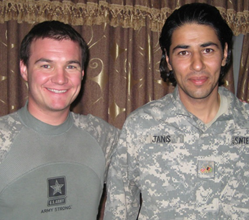In 2008, my wartime translator saved my life during a firefight in Afghanistan. I counted on Janis Shinwari to help me navigate in a foreign land with a very different culture. He also looked our for the safety of my troops and myself. Thousands of American troops in Iraq and Afghanistan similarly counted on their interpreters — known as ’Terps — to have their backs during while fighting in-country.
Ten years after my service, I now regularly count on my Afghan and Iraqi brothers to navigate me through the streets of a more familiar land — my home in the Washington metro area. When I request a Lyft, I frequently learn that the driver is an Afghan or Iraqi Special Immigrant Visa holder, a special visa program created solely for wartime interpreters who served honorably for two or more years (and some many more years than that) alongside American troops. For many of these individuals, remaining in their home countries is a death sentence as they are hunted by ISIS and the Taliban.
There are more than 69,000 SIV-holders and their immediate family members now living in the United States. In the D.C.-Northern Virginia-Maryland region, there are more than 11,000 SIV families. Coming to the United States is not without incredible challenges for these heroes. It takes at least three years to undergo the most rigorous visa approval process our country has for an interpreter and his family to be approved to resettled. They come with one suitcase, few belongings, and little money. Often, their professional credentials do not transfer here and they have to start over completely in, especially for this area, an expensive new city.
Driving with Lyft has become the single largest earning opportunity for interpreters. Thousands already drive on the platform, and more join every month. Lyft provides a flexible earning opportunity in which these new immigrants can drive full-time or part-time to provide more resources for their families.
Of course, drivers need a car. But this can be out of reach for many of these visa holders, which is why Lyft and No One Left Behind have partnered to create a unique package of benefits for interpreters, such as the Express Drive program.
Express Drivers rent a car through a third-party partner, like Hertz or Flexdrive, and are given the opportunity to earn weekly bonuses to offset the cost of the rental. Lyft has demonstrated a strong commitment to veterans and service members, and extends a similar honor to our wartime allies, who moved to the top of the wait list, receive a free first week rental, and have their deposit waived.
No One Left Behind is a nonprofit organization I started with my interpreter Janis after he resettled here. The amount of bureaucratic red tape I and others had to cut through along with heart-wrenching delays that put his family in danger the longer they remained in Afghanistan inspired us to want to help others. To those of us who have worked with ’Terps, they are just as much a soldier as anyone else in uniform.
We owe them an extraordinary debt of gratitude. The private sector recognizes this as well. The visas the interpreters hold give them full work eligibility. They are highly educated and have made incredible sacrifices for our country and their own families. Through our formal partnerships with corporate partners like Lyft and others, we are able to provide more earning opportunities for this population while also driving value and profit for businesses. Lyft’s ridesharing network provides a unique opportunity for motivated drivers to earn a living — and connect with Americans in the backseat — once again getting us safely to our destinations.
We just celebrated Veterans Day on which Americans gave thanks to men and women who have served our great nation. There are thousands of others, though, who have served as well. So the next time you find yourself in a Lyft, talk to your driver. He or she just might be an unlikely American hero.

